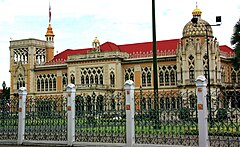Government House of Thailand
| Government House | |
|---|---|

Government House of Thailand in 2009
|
|
| General information | |
| Architectural style | Venetian Gothic |
| Town or city | Dusit District, Bangkok |
| Country |
|
| Construction started | 1925 |
| Technical details | |
| Size | 45,000 m2 |
| Design and construction | |
| Architect | Corrado Feroci |
The Government House (Thai: ทำเนียบรัฐบาล; rtgs: Thamniap Ratthaban) is the offices of the Prime Minister of Thailand and the appointed cabinet ministers. It also contains conference rooms and is used for state functions and receptions of foreign guests. It consists of several palace-like structures extending over 11 acres (45,000 m2). King Vajiravudh (Rama VI) commissioned the Italian architect Annibale Rigotti to design the main building in 1923, although construction would remain incomplete as Rigotti returned to Italy after the king's death in 1925. Initially intended as a family residence for one of the king's favorite generals, the building became the Prime Minister's seat in 1941. Prime Minister Plaek Pibulsonggram then assigned Italian sculptor and artist Corrado Feroci to complete the construction (also working on the building at this point was the architect Ercole Manfredi). The main building carries a golden dome housing a statue of Phra Phrom (Brahma) and its façade resembles that of the Ca' d'Oro Palazzo in Venice.
During the 2008 Thai political crisis, anti-government protesters besieged the Government House. After a court order, they had to move, but then attempted to block the government house once more and succeeded - the cabinet temporarily moved to Don Mueang International Airport.
The protesters besieged Don Mueang International Airport soon after that, giving the cabinet nowhere to work. On 1 December 2008, after protesting for 3 months, the protesters decided to leave the government house as there were constant attacks of bombs, grenades and gunfire.
...
Wikipedia
